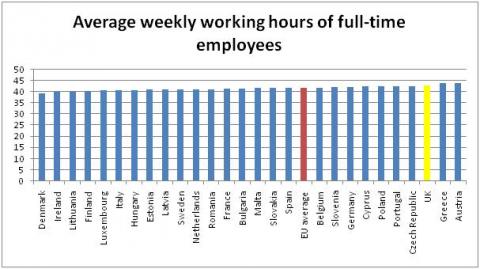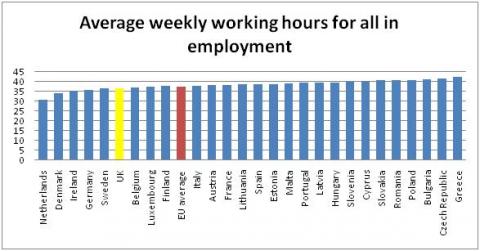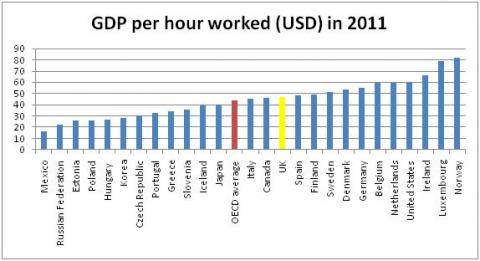Are the British workforce lazy idlers?
"Once they enter the workplace, the British are among the worst idlers in the world," they said. "We work among the lowest hours, we retire early and our productivity is poor."
Quoted by Evening Standard, 17 August 2012
"Average working hours for full-timers in the UK are the highest in Europe apart from those of Austria and Greece.... Britons retire a little later on average than Germans and Americans. As for productivity, no two economists can agree how to measure it."
Independent on Sunday, 19 August 2012
On Friday the Evening Standard claimed to have carved a public peephole into the content of 'Britannia Unchained — Global Growth and Posterity', an as yet unpublished work penned by five Conservative MPs.
According to the Standard's report, the book includes a vitriol against the British population; claiming that too many of us "prefer a lie in" to putting an extra hour in. Those who do manage to pull their heads away from their pillows are still clocking up fewer hours than their international counterparts.
Amongst the media army springing to the defence of the labour force of Britain was an Independent on Sunday article, claiming that the average British full-timer works some of the longest hours in the world.
But who is right? Full Fact gets out of bed and into the facts.
Analysis
As 'Britannia Unchained' is yet to be published and the authors have so far been less than amenable to commenting further, Full Fact cannot be sure of the source of the claims the book allegedly made.
What we can do is to look at some official statistics and see if they throw some light on the three main claims of the leaked content and the disagreement of the Independent on Sunday's article: British workers' short working week, early retirement age, and poor productivity.
Working Hours
A wide comparison of the UK worker's average working week with countries outside of the EU is very difficult.
The Organisation for Economic Co-operation and Development (OECD) provides statistics on annual average working hours for employees in its 34 member countries. However, the data comes hand in hand with a warning that direct comparison of the countries' labour hours are not possible for any one year due to differing methodologies and quality of data collection.
However, a narrower comparison with EU countries is possible, and the Independent on Sunday's claim about the average working hours for full-time workers in the UK can be easily traced to the latest European Union Labour Force Survey (EU LFS) results.
The EU LFS is a quarterly household sample survey on the labour force, collected by the national statistics institutes of the 33 participating countries. The results for April to June 2011 surveyed about 1.5 million individuals and do indeed show that UK full-time employees come third on the rankings for highest average working hours:

We can see from the graph that the UK is above the EU average, as well as economic-powerhouse Germany.
However, the UK slips several places down to below the EU average when the hours of the average working week for all people in employment (including part time and self-employed) are taken into account:

This may be because of the large population of part-time workers in the UK (which reached 8.07 million in August 2012) bringing down the average working time for all individual workers.
What is clear from the EU LFS statistics is that the average UK worker seems to put in more hours than the average German worker, which is often used as a comparative benchmark. However it's difficult to draw definite conclusions without accounting for part-time workers and overtime.
Retirement Age
According to OECD data, the statutory retirement age of both men and women can differ widely between different countries.
However, this gives no useful indication of the age at which UK or international workers will exit the labour market, because sometimes individuals will retire before or after the statutory retirement age.
The Eurostat 2009 Ageing Report provides data on the average retirement age of workers in 2007 in the EU countries which were able to provide the appropriate data. The graph below gives us an idea of the UK's positioning compared to other EU countries:

As we can see, the UK remains well above the EU average. It is also higher than the average exit age for German workers, exonerating the Independent article's claims concerning Germany.
However, if we split the average age of retirement according to gender, we find the average retirement age for men was 63.6 in 2007, below the statutory retirement age for men. Women, however, retired on average at age 61.7 in 2007, which is slightly above their state pension age.
So, although the UK average retirement age is relatively high compared to other EU countries, the average male will retire early which does, to some extent, support the alleged claims of 'Britannia Unchained'.
Productivity
The Independent on Sunday is correct to point out that a nation's economic productivity is a sticky and complex subject. However, it is certainly possible to consider official statistics to gauge at least some understanding of the productivity of the UK labour force compared to other countries.
The most widely used definition for productivity - GDP per hour worked - can be found via OECD data for the year 2011.
It is a rough estimate and should be treated as such — calculated by taking the gross domestic product (GDP) of the country's entire population and dividing it by the number of workers. However, the graph below reveals where UK worker's rank against other OECD countries according to their productivity:

On this definition of productivity then, the UK hovers above the OECD average, but still cannot compete with the US and Germany.
Conclusion
Although a complete comparison of the UK labour force with workers from all other countries is not available, according to Eurostat data, UK full-time workers do not work among the fewest hours compared to its close neighbours. Once part-time and self-employed workers are factored out, they nearly work the most hours per week.
Neither do they appear to retire the earliest, although men, on average, will retire before state pension age.
And according to OECD statistics, neither do they produce the least GDP per worker.
Of course, without seeing the much anticipated book which supposedly makes these claims it's not possible to confirm what measures they may be using. We will have to wait till next month to hear the other side to the story.